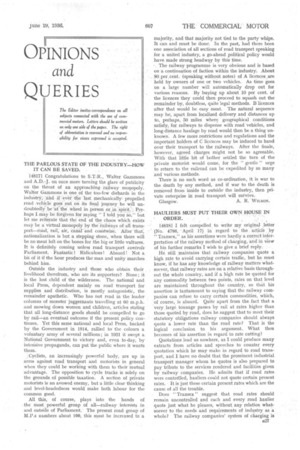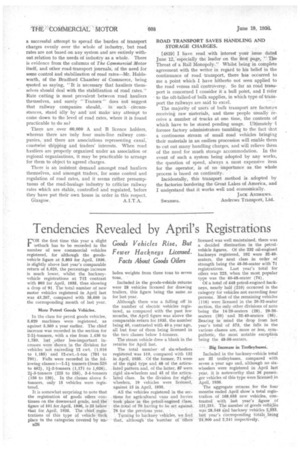OP it INIONS
Page 37

Page 38

If you've noticed an error in this article please click here to report it so we can fix it.
and QUERIES
THE PARLOUS STATE OF THE INDUSTRY—HOW IT CAN BE SAVED.
14817] Congratulations to S.T.R., Walter Gammons and A.D.-J. on once more turning the glare of publicity on the threat of an approachingrailway, monopoly. Walter Gammons is one of the too-feW diehards in the indUStCY, and if ever. the last mechanically: propelled road ,vehicle goes out on its final journey he will undoubtedly be at the Wheel in person or in:spirit._ Perhaps I may be forgiven for saying " I told you so," but let me reiterate that the end of the chaos which exists may be a virtual monopoly by the railways of all transport—road, fail; air, Canal' and coastwise. Alter that nationalization is but a stepping stone,. when there will be no meat left on the bones for the big or little vultures. It is definitely coming unless road transport controls Parliament. Fantastic! Ridiculous? 'Absurd Not a bit of it if the hour produces the man and unity marches behind him.
Outside the industry and those who obtain their livelihood therefrom, who are its supporters? None ; it is the lost child of the wilderness. The national and local Press, dependent mainly on road transport for supplies. and distribution, is mostly antagonistic, the remainder apathetic. Who has not read in the leader columns of monster juggernauts travelling at 60 m.p.h. and mowing down women and children, articles stating that all long-distance goods should be compelled to go by rail-an eventual outcome if the present policy con-tine:es. Yet this same national and local Press, backed by the Government in 1914, rallied to the colours a voluntary army of several millions; in 1931 it swept a National Government to victory and, even to-day, by intensive propaganda, can put the public where it wants them.
:Cyclists, an increasingly powerful body, are up in arms against road transport and motorists in general when they could be working with them to their 'mutual advantage. The opposition to cycle tracks is solely on the grounds of possible taxation. A section of private motorists is an avowed enemy, but a little clear thinking and level-headedness would make both labour for the common good.
All this, of course, plays into the hands of the most powerful group of all—railway interests in and outsiae of Parliament. The present road group of M.P.s numbers about 100, this must be increased to a majority, and that majority not tied to the pasty' whips. It can and must be done. In the past, had there been one association of all sections of road transport speaking for a united industry, a go-ahead political policy would have made strong headway by this time.
. The railway programme is very obvious and is based on a continuation of faction within the industry. About ..80..per,cent. (speaking_ without notes) of A licences ..are held by owners of one or two vehicles. As time goes On a large number will automatically drop out for various reasons. By buying up about 10 per cent. of the licences they could then proceed to squash out the remainder by, doubtless, quite legal methods. B licences alter that would be easy meat. The natural sequence may be, apart from localized delivery, and distances up to, perhaps, 50 miles where geographical conditions satisfy, for railways to dispense with road Vehicles, and long-distance haulage by road would then be a thing unknown. A few more restrictions and regulations and the important holders of C licences may be induced to hand over their transport to the railways. Alter the finale, however, agreed charges might not be so agreeable. With that little bit of bother settled the turn of the private motorist would come, for the " gentle " urge to return to the railroad can be expedited by so many
• and various methods.
There is no such word as co-ordination, it is war to the death by any method, and if war to the death is removed from inside to outside the industry, then private enterprise in road transport Will survive.
Glasgow. A. R. WILSON. HAULIERS MUST PUT THEIR OWN HOUSE IN ORDER. •
I-48181 I felt compelled. to write my original letter (No. 4786, -April. 17) in regard to the article by " Transex," as his assertions were hardly a correct interpretation of the railway method of charging, and in .iA.ew of his further remarks I wish to give a brief reply. • He. still maintains that railway companies quote a high rate to avoid carrying certain traffic, but he must know, if he has any knowledge of railway matters whatsoever, that railway rates are on a relative basis throughout the whole country, and if a high rate be quoted for any 'commodity between two points, rates on that level are maintained throughout the country, so that his assertion is tantamount to saying that the railway companies can refuse to carry certain commodities, which, of course,. is _absurd. Quite apart from the fact that a very large. tonnage passes by rail at rates higher than those quoted by road, does he suggest that to meet their statutory obligations railway companies should always quote a lower rate than the road rate? That is the logical conclusion to his argument. What then becomes of his assertion in regard to rate cutting?
Quotations lead us nowhere, as I could produce many extracts from articles and speeches to counter every quotation which he may make in regard to road transport, and I have no doubt that the prominent industrial tranSpoit manager whom he quotes is also prepared to pay tribute -to the services rendered and facilities given by railway companies. He admits that if road rates were controlled, hauliers could not quote certain present rates. It is just these certain present rates which are the cause of all the trouble.
• Does " Transex " suggest that road rates should remain uncontrolled and each and every road haulier quote just what he pleases, without any relation whatsoever to the needs and requirements of industry as a whole? The railway companies' system of charging is
a auccessful attempt to spread the burden of transport charges evenly over the whole of industry, but road rates are not based on any system and are entirely without.rela!tion to the needs of industry as a whole. There is evidence from the columns of The Commercial Motor itself, and other road-transport journals, of the need for some control and stabilization of road rates—Mr. Holdsworth, of the Bradford Chamber of Commerce, being quoted as saying, 'It is necessary that hauliers themselves slimild deal with the stabilization of road rates." Rate cutting is most prevalent between road hauliers themselves, and surely " Transex doe's not suggest that railway companies should, in suchcircumstances, stand idly by and not make any atteMpt to conie down to the level of road rates, where it is found practicable to do so?
There are . over 60,000 A and B licence holders, whereas there are -Only four main-line railway companies,..and there are associations representing canal,. coastwise 'shiPPing and traders' interests. When road hauliers are properly organized under an association or regional organizations, it may be practicable to arrange for them to object to agreed charges.
There is an insistent demand amongst road hauliers themselves, and amongst traders, for some control and regulation of road rates, and it seems rather presumptuous of the road-haulage industry to criticize railway rates which are stable, controlled and regulated, before they have put their own house in order in this respect.
Glasgow. A . I .T. A. ROAD TRANSPORT SAVES HANDLING AND STORAGE CHARGES.
[4819] I have read with interest your issue dated June 12, especially the leader on the first page, " The Threat of a Rail Monopoly." Whilst being in complete agreement with the writer, in regard to his belief in the continuance of road 'transport, there has occurred to me a point which I have hitherto not seen applied to the road versus rail controversy. So far as road transport is concerned I consider it a bull point, and I refer to the oft-talked-of bulk supplies, in which type of transport the railways are said to excel.
The majority of users of bulk transport are factories receiving raw materials, and these people usually ceive a number of trucks at one time, the contents of which have to be stored pending usage. Ultimately -I foresee factory administrators tumbling to the fact that a continuous stream of small road vehicles bringing their materials in an endless procession will enable them to cut out many handling charges, and will relieve them of the need for muth storage accommodation. In the event of such a system being adopted by any works, the question of speed, always a most expensive item for the operator, is of no importance as the whole process is based on continuity. Incidentally, this transport method is adopted by the factories bordering the Great Lakes of America, and I understand that it works well and economically.
JACK ANDREWS
Swansea. Andrews Transport, Ltd.




















































































